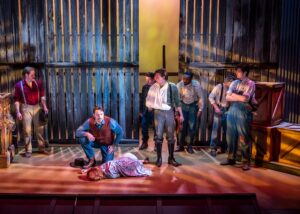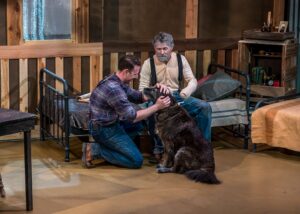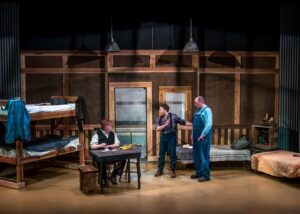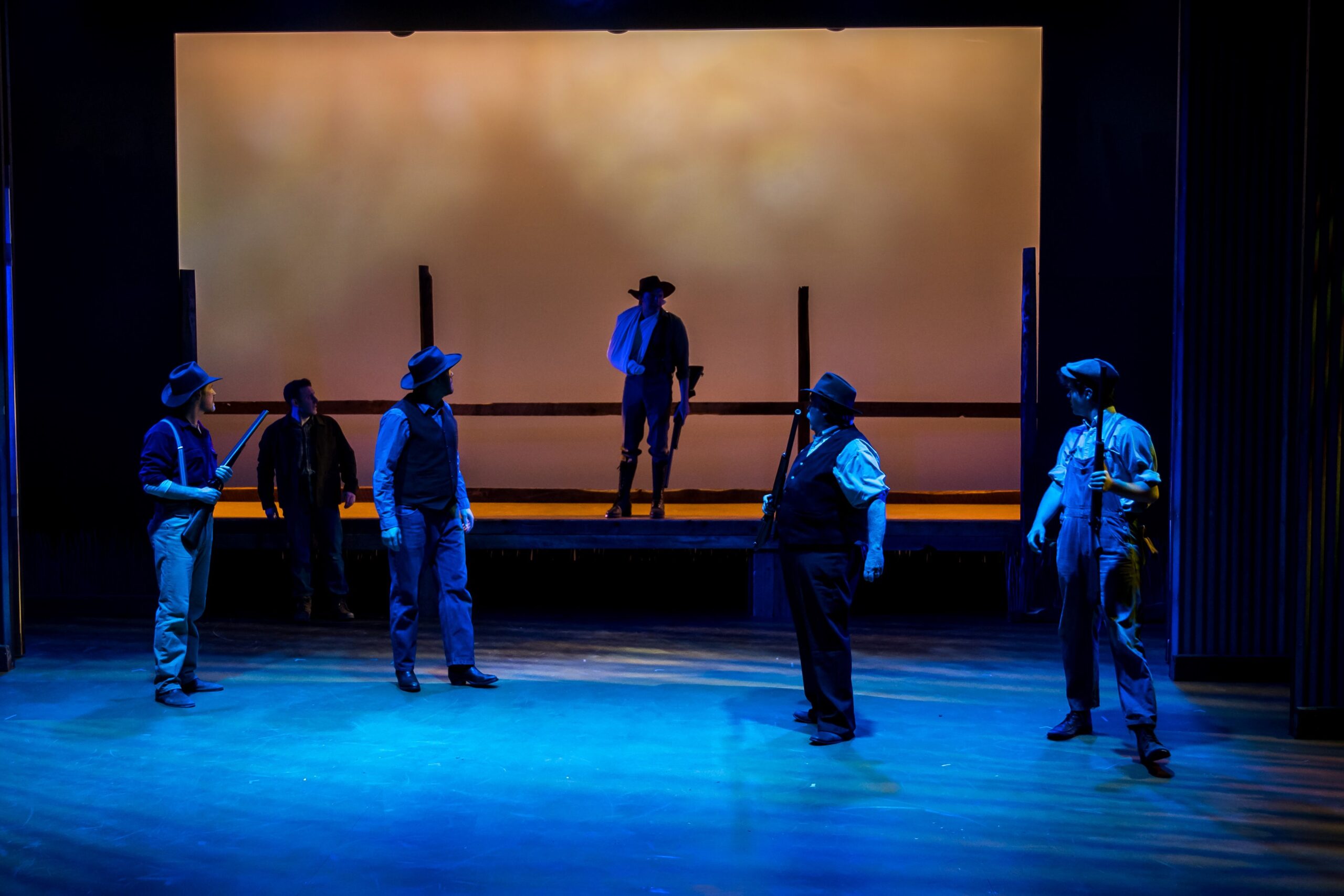SOUTH SALT LAKE — Salinas, California is lush and green with a cool ocean breeze year round. The home of John Steinbeck is memorialized there as his writings so profoundly impacted America, perhaps none more so than his depression era story Of Mice and Men. The Parker Theatre production that I saw on March 30 was a production that was poignant and profound from start to finish with actors hitting the right notes and highlighting the right moments to point towards the play’s tragic conclusion.
The most challenging aspect to the Of Mice and Men script is a fair portrayal of Lennie. While there is no clinical diagnosis for the fictional character, Brinton M. Wilkins brought a clear vision of who this person is to the stage. In Wilkins portrayal, you have Lennie as a large older man who often blinks and rarely makes eye contact. His vocal cadence belies a man whose brain struggles with quick processing and syntax. Throughout the whole production, Wilkins kept his hands in a rhythmic motion where select fingers were never totally calm. His breathing was noticeably different when he was being soothed by the feeling of something soft or agitated by the presence of stressors. While I don’t have a way to express exactly where Lennie’s neurodivergence from the typical lies, it was abundantly clear that Wilkins, in concert with his cast mates and director Joanne Parker, had a vision, and that was expertly executed. A portrayal of Lennie could easily devolve into hurtful and unfair tropes of some of society’s most vulnerable people. In this portrayal that didn’t happen and it made the whole story that much richer and heavier.

Watching George, played by local special education teacher Lucas Charon, interact with Lennie was to both agitating and worthy of commiseration. George knows all too well the price he’s paying for taking care of Lennie, and that comes out in sporadic bursts in the early parts of the play. Anyone who is a caregiver can relate to the demanding nature of caring. At the same time, watching George berate and condemn someone who, in this portrayal, clearly had no concrete grasp of why what he was doing was problematic, was painful. While several of their interactions earned laughs of discomfort from the audience, I found myself mostly saddened watching their relationship torqued on stage from the play’s early stages and on through the end. In a play where you really have to nail the key characters to get a sympathetic response from the audience, Charon and Wilkins were an ideal duo.
I was also impressed by Kiirt Banks’ portrayal of Crooks. Banks played the character physically hunched over and emotionally closed off through the early parts of the play. As Lennie invaded Crooks’ barn room in the play’s second act, Banks seemed to enjoy twisting the knife on the thought that George may never return. When he is physically accosted by Lennie, his terror seemed genuine and Banks did a nice job standing a bit taller and more leery of what an unbridled Lennie could do.

The rest of the ensemble filled out nicely as well. Ashley Slater played Curly’s wife beyond the potentially misogynistic tropes of the story. Yes, she was openly flirty, but her arc developed as well as each character. She was bright and evocative in the right moments. Slater contrasted this well with her vulnerability as she opens up to the men about her relationship. Her need to leave abuse before she became too broken was absolutely believable. I think my only real grievance with the play was the use of Slater’s body as a corpse prop for about 5 minutes. It’s a plot device and hard to work around the story’s need to see the body of Curly’s unnamed wife for the story to develop the way it does. It just continues to feel indelicate in the telling of this story.
Joanne Parker’s direction made the aims of each character incredibly clear. The scene where Carlson is berating Candy for his smelly dog — who is a good boy named Apollo — and pushing for the dog’s execution was strong dialogue work between Ben Lowell’s Carlson and Brook Robertson’s Candy. The real tension raising came, however, from the ominous silence from the other characters on stage refusing to intervene on the dog’s behalf. The stage business that took place while the dog was led to his execution was laced with the meaning behind it. Robertson’s despair was palpable and watching him crumple in loneliness was a powerful precursor for the same moment later in the show.

I’ve been consistently impressed with the lengths Parker Theatre goes to in making technical elements integral to the show. Whether that was a massive pumpkin puppet, a Christmas coffin, or eye-catching sets, I have come to have high hopes for the visual and auditory elements of Parker plays. This play’s success was in its simplicity. A few simple set changes transported the boarding house where Lenny and George stay to the barn locations and by stripping everything down again it was a simple field. It worked on each level.
To be clear, this show was depressing to watch. It’s a tragedy. I think I had one good laugh in the whole play, and it was a bit of physical comedy when Lennie is bucking twice as fast as anyone else. The rest of the play was warm, thoughtful, and had moments of sensitivity; but it wasn’t happy. At times I have been critical of Parker’s making light of serious moments, and that never happened in this play. Of Mice and Men is not a play everyone would seek out. To those that need the catharsis of this story, however, this production was superb.

Parker Theatre is to Utah’s theatre community what Steinbeck is for American literature. It might not be the first name off of everyone’s lips, but you have an incomplete understanding of what makes Utah Theatre so good without knowing what Parker brings. Of Mice and Men was another gripping, though painful, chapter in Parker’s excellent body of work.
[box] Of Mice and Men plays Fridays and Saturdays at 7:30 PM with Saturday Matinees at 3:30pm, through April 27 at the Parker Theatre (3605 S. State Street, South Salt Lake). Tickets are $17-30. For more information, visit www.parkertheatre.org [/box]

